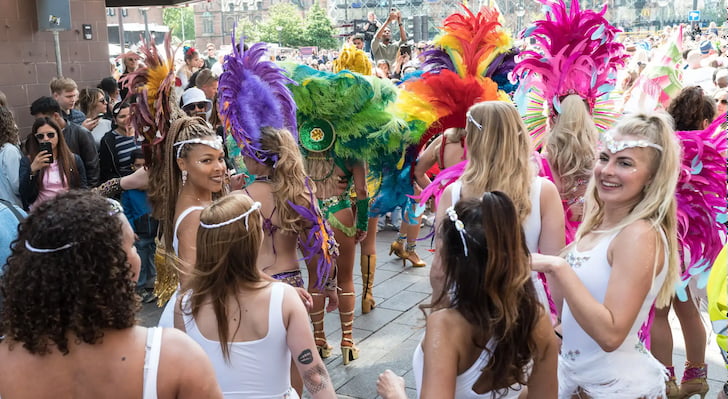The first Copenhagen Carnival was organized in 1982 by the association “Carnival in May”. It was a huge success, with 500 dancers and 60,000 spectators. Since its inception, the carnival has grown into the largest world music festival, with several dozen free concerts and dance shows featuring more than 500 performers, as well as the traditional carnival parade, which celebrates folk music and folk dance from different corners of the world.
The Copenhagen Carnival represents culture from Denmark and its neighbors (Germany, Norway and Sweden), Latin America and the Caribbean (Argentina, Bolivia, Brazil, Colombia, Cuba, Mexico, Peru, Trinidad and Tobago), Asia (China) and other parts of the world, celebrating the many folk cultures of our planet with their unique music and dance.
The Copenhagen Carnival takes place over three days (Friday, Saturday, Sunday) in three different parts of Copenhagen. The main event on the first day of Carnival is a huge street party in the Nørrebro district, known for its multi-ethnic community. Nørrebro Bloco is a lively street party led by a live samba orchestra of more than 150 musicians and dancers, and everyone is welcome to join in. It starts at the Union Culture House and moves through the neighborhood to Dronning Louises Bro, a bridge that connects Nørrebro to downtown Copenhagen.
The highlight of the Copenhagen Carnival is the Copenhagen World Carnival Parade, which takes place on Saturday and features more than 500 performers from over a dozen countries. The parade route starts at Nørreport station and runs through Copenhagen’s main shopping street, Strøget, to City Hall Square. The lively parade lasts about three hours and is followed by dance shows, concerts and samba jams in the city center that last into the evening.
Sunday is a family day, with the main event being the Copenhagen Culture Carnival in Enghaveparken, a public park in the Vesterbro district. It features concerts, dance shows, ethnic food, workshops and other family-friendly activities with a more relaxed atmosphere than the previous days’ events.
All Copenhagen Carnival events are free of charge. However, spectators are expected to “pay” by staying after each of the main events for a collective litter pick to make sure the area is as pristine as it was before the carnival.

Photo: copenhagencarnival.dk




